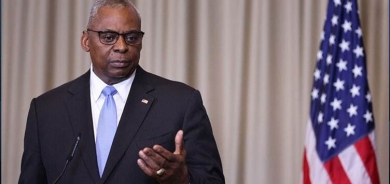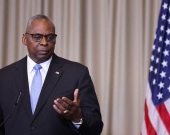Egypt prepares for Shenouda’s funeral; voting on new pope to be decided in 2 months

His funeral will be held on Tuesday, Egyptian state media reported.
Based on wishes stated in his will, Shenuda will be buried at St. Bishoy Monastery of Wadi al-Natrun in the Nile Delta, where he spent time in exile after a dispute with the late president Anwar al-Sadat, Egypt’s state media reported.
Shenouda was banished to Wadi al-Natrun Monastery in 1981 by Sadat after he criticized the government’s handling of an Islamic insurgency in the 1970s and Egypt’s 1979 peace treaty with Israel.
Bishop Pachomious of the Nile Delta province of Beheira has assumed papal duties for two months until a council of senior clergy meets to choose a new pope, state television said.
The successor would be chosen according to procedures laid out in 1957 church bylaws.
Egyptian media described the procedure for choosing a new pope as one based on a system of voting by board members of the church’s city councils. The council’s vote on three preferred candidates, and the final choice is made when a name is picked out of a box by a young child, the media said.
Coptic bishops from around the world have already started to fly in for meetings on the funeral arrangements and succession.
Paying final respects
Interim military rulers paid tribute to the church, visiting the grounds of the Orthodox Coptic Cathedral in Cairo. Head of the ruling Supreme Council of the Armed Forces, Field Marshal Hussein Tantawi, visited the cathedral to pay his last respects and promised to air lift Shenouda’s body to where he will be buried.
Egyptian Copts flocked from all over the country on Sunday and queued at the cathedral to bid farewell to a man under whom the Coptic Church sought to remain the sole political and religious authority for Egypt’s Christian minority, according to Reuters.
Pope Shenouda III spent the last months of his four decades at the head of Egypt’s Orthodox Church trying to soothe sectarian tensions that have escalated since the ouster of president Hosni Mubarak.
Condolences flooded in from around the world, with U.S. President Barack Obama hailing Shenuda as an advocate for tolerance and religious dialogue.
Pope Benedict, leader of the world’s Roman Catholics, offered prayers after being informed of Shenuda’s death.
“I would like to express to the members of the Holy Synod, to the priests and to the faithful of the Patriarchy, my strongest feelings of fraternal compassion,” said Benedict.
“I can say how much the entire Catholic Church shares the suffering of the Orthodox Copts,” Benedict said in a statement released by the Vatican.
Describing Shenouda as a long-time advocate of unity among Christians, he said the Catholic Church “shares the pain afflicting Orthodox Copts.”
“We will remember Pope Shenouda III as a man of deep faith, a leader of a great faith, and an advocate for unity and reconciliation,” the U.S. president said in a statement issued by the White House.
Obama said Shenouda had been committed to national unity and was “a beloved leader of Egypt’s Coptic Christians and an advocate for tolerance and religious dialogue.”
French Foreign Minister Alain Juppe also offered his condolences, adding that Shenuda “had developed a dialogue with other Christian churches and with Islam in a spirit of tolerance, making a profound mark on the history of his country, Egypt,” according to AFP.
Organization of Islamic Cooperation chief Ekmeleddin Ihsanoglu called Shenuda’s death “a great loss not only to the Coptic Christian community, but for the world at large.”
Muslim leaders in Egypt were quick to express their condolences.
Grave calamity
Shenuda’s death is “a grave calamity that has afflicted all Egypt and its noble people, Muslims and Christians,” the country’s mufti, Ali Gomaa, said in a statement.
Israel’s foreign ministry also sent its “sincere condolences,” hailing Shenuda as “an important spiritual leader” who contributed to “fraternity and coexistence in Egypt.”
EU chief diplomat Catherine Ashton called him “a respected and visionary leader.”
Cairo-based Arab League chief Nabil al-Arabi described Shenuda in a statement as “an Egyptian and national personage who took upon himself responsibilities for Egyptians and all Arabs.”
Shenuda died on Saturday aged 88 after a long illness after leading the Copts, estimated at 10 percent of Egypt’s population of more than 80 million, for a whole generation, during which the country was hit by a wave of militancy from which he sought to protect his flock.
Shenuda leaves behind a nervous community, a target of frequent sectarian attacks in recent years, with complaints of routine harassment and systematic discrimination and marginalization.
Egypt’s Christians are particularly concerned over the rise and increased assertiveness of Islamists, following the uprising that toppled Mubarak.
Shenouda had served as the 117th Pope of Alexandria since November 1971, leading the Orthodox community who make up most of Egypt’s Christians.
Shenouda was popular among many of Egypt’s Christians even outside the Orthodox Church, as well as among many Muslims. However, some Christian activists said Shenouda should have pushed the state harder to secure more rights for Christians.
In one phrase Shenouda often repeated and which was also cited in newspapers on Sunday, he would say: “Egypt is not a nation we live in, rather it is a nation that lives in us.”
Under Mubarak’s rule, relations between the government and the Coptic church were generally smooth, with the pope portrayed in state media as a symbol of religious harmony, despite occasional outbreaks of sectarian violence.
Shenouda’s logic
Shenouda publicly supported Mubarak during his last days and before Mubarak’s ouster by a popular uprising on Feb. 2011, a move that drew some criticism from some members of his church who joined the protests that ousted the president.
A report published by Egypt’s al-Masry al-Youm on Sunday mentioned that Shenouda’s logic stopped resonating with many Copts after January 2010, when six Copts were killed in a drive-by shooting in the Upper Egyptian town of Nagaa Hammadi. The attack marked a turning point for many Christians, who accused Mubarak’s government of complicity in sectarian attacks. In the meantime, they began hinting criticism of what they perceived as the Pope’s soft statements on the government.
By the end of the year, hundreds of Copts clashed with Central Security Forces who tried to halt the construction of a church in the poor neighborhood of Omraneya. The incident left one Copt dead and set the first precedent of violence between Mubarak’s police and Christians.
Coptic outrage reached its peak less than two months later when a bombing claimed the lives of at least 21 people outside a church in Alexandria as worshippers were coming out of the New Year Eve’s mass. For the first time, Copts took to the streets denouncing Mubarak’s rule, a clear deviation from the Church’s guidelines.
During the January 2011 revolution, many Coptic youths pursued their rebellious approach by violating the Church’s orders not to engage in protests, which was held as an indicator that the ailing Shenouda was losing his political control over the Christian community.
The report published by Egypt’s al-Masry al-Youm wondered will the next pope be capable of filling the same role despite the brewing discontent that rocked the Coptic community in Shenouda’s last two years over the Church’s unwillingness to criticize a state that is widely viewed as “discriminatory” against Christians?
By AL ARABIYA














